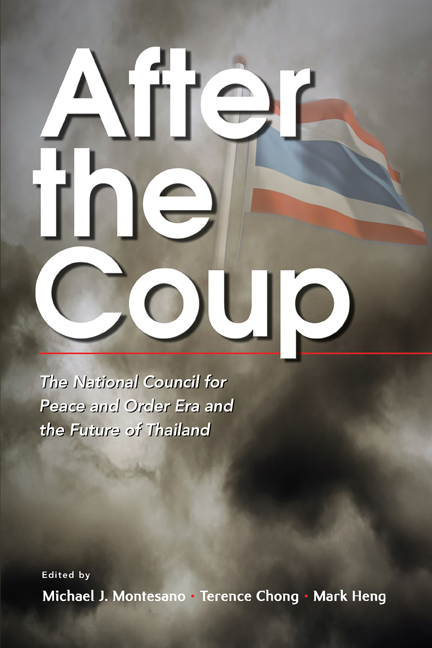Book contents
- Frontmatter
- Contents
- About the Contributors
- 1 Introduction: Thai Realities and Possibilities after the 22 May Coup
- 2 The Rise of the Thai Upper Middle Class and its Turn against Democracy
- 3 “We the Southerners Come to Protect the Nation and the King”: Southerners’ Political Rise and Regional Nationalism in Thailand
- 4 Exit, Voice, (Dis)loyalty? Northeast Thailand after the 2014 Coup
- 5 The Red Shirts and their Democratic Struggle in Northern Thailand, April 2010 – May 2015
- 6 The Shifting Battleground: Peace Dialogue in Thailand's Malay-Muslim South
- 7 Thailand's Zigzag Road to Democracy: Continuity and Change in Military Intervention
- 8 Murder and Regress: Violence and Political Change in Thailand
- 9 Thailand's Politics of Decentralization: Reform and Resistance before and after the May 2014 Coup
- 10 Change and Continuity in the Politics of the Media after the Coup
- 11 Thailand's Royal Democracy in Crisis
- 12 The Foreign Press and its Changing Perceptions of the Thai Monarchy
- 13 Thai Economic Growth: Retrospect and Prospect
- 14 Features and Challenges of an Ageing Population in Thailand
- 15 Conclusion: Thailand in Transition
- Bibliography
- Index
2 - The Rise of the Thai Upper Middle Class and its Turn against Democracy
Published online by Cambridge University Press: 23 May 2019
- Frontmatter
- Contents
- About the Contributors
- 1 Introduction: Thai Realities and Possibilities after the 22 May Coup
- 2 The Rise of the Thai Upper Middle Class and its Turn against Democracy
- 3 “We the Southerners Come to Protect the Nation and the King”: Southerners’ Political Rise and Regional Nationalism in Thailand
- 4 Exit, Voice, (Dis)loyalty? Northeast Thailand after the 2014 Coup
- 5 The Red Shirts and their Democratic Struggle in Northern Thailand, April 2010 – May 2015
- 6 The Shifting Battleground: Peace Dialogue in Thailand's Malay-Muslim South
- 7 Thailand's Zigzag Road to Democracy: Continuity and Change in Military Intervention
- 8 Murder and Regress: Violence and Political Change in Thailand
- 9 Thailand's Politics of Decentralization: Reform and Resistance before and after the May 2014 Coup
- 10 Change and Continuity in the Politics of the Media after the Coup
- 11 Thailand's Royal Democracy in Crisis
- 12 The Foreign Press and its Changing Perceptions of the Thai Monarchy
- 13 Thai Economic Growth: Retrospect and Prospect
- 14 Features and Challenges of an Ageing Population in Thailand
- 15 Conclusion: Thailand in Transition
- Bibliography
- Index
Summary
The upper middle class, the social group between the upper class and the lower middle class, comprises mainly professionals, senior-level employees of firms and business-owners. This class has contributed in crucial ways to Thailand's current political crisis. Taking active roles in the People's Alliance for Democracy (PAD) movement of 2005–8 and in the People's Democratic Reform Committee (PDRC) movement of 2013–14, its members opposed former prime minister Thaksin Shinawatra and his political allies. While they claimed to be struggling for a more substantive form of democracy, they in fact contributed to the Thai military's return to power, and they have since become the main support base for the current military regime in Thailand. One can therefore raise crucial questions about the political stance of the Thai upper middle class, and especially about the emergence of its members’ antagonistic perception of electoral democracy, and the conditions that have influenced this perception.
This chapter undertakes two major tasks. The first task is to pursue a quantitative analysis of socio-economic data to describe the development of the Thai upper middle class. The goal is to place this development in the broader context of Thai society and to understand the group's socioeconomic characteristics in order to provide insight into the conditions that have shaped the Thai upper middle class's attitudes towards democracy. The second task of this chapter is to build on that insight. The chapter draws on interviews with fifteen members of the Thai upper middle class, all older than fifty years of age, and selected to represent various segments of that class. In-depth interviews with these respondents covered the trajectories of their lives and the development of their political perspectives in the changing socio-economic context. The goal was to understand conditions that have influenced their turn against democracy.
The chapter begins by contextualizing the shifting political stance of the Thai upper middle class with a literature review that sets the scope of the chapter's investigation. It then offers a quantitative socio-economic analysis of the rise of the Thai upper middle class from the 1980s to the present. A qualitative examination of the lives and political perspectives of the Thai upper middle class follows that quantitative analysis.
- Type
- Chapter
- Information
- After the CoupThe National Council for Peace and Order Era and the Future of Thailand, pp. 24 - 57Publisher: ISEAS–Yusof Ishak InstitutePrint publication year: 2019

